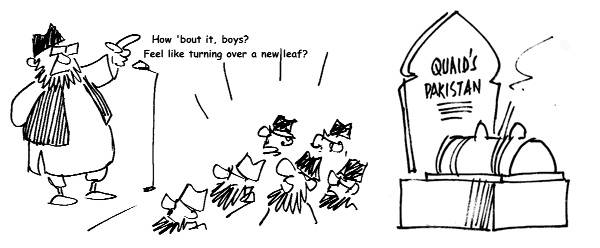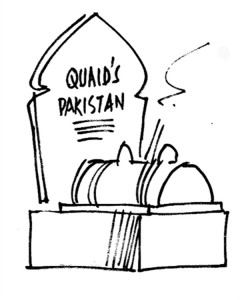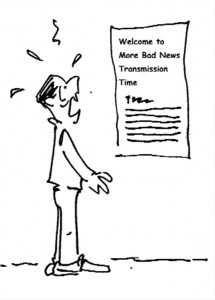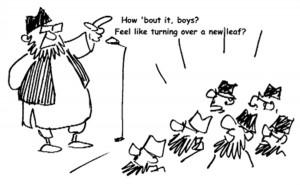
Environmental disaster

Sir,
Over 1,300 Pakistani citizens residing in Karachi died because of a soaring heat index, dehydration and contaminated water-related illnesses, all the while contending with electricity failures. Those in power in Islamabad and Sindh and their land developer associates are familiar with the efforts and investments made by the rulers of Dubai to convert vast desert areas into green belts through intensive tree plantation drives and such. High-rise buildings, roads, bridges and housing colonies have been built in deserts along with concerted efforts to provide green belts and amenity parks for a better and healthier environment. The rulers of Dubai would never allow real estate developers to build housing societies or skyscrapers on previously developed green belts because they have a sense of ownership of the land they live on.
Members of the ruling elite and corrupt bureaucracy in Pakistan, whose families live in Dubai or other foreign countries, are involved in converting centuries-old natural greenbelts into concrete jungles; they cut down trees and destroy forests and natural seashore habitats, thereby disturbing an already-delicate environmental balance. This is likely to have devastating consequences for those who have chosen to live and die in this country.
Human beings need Mother Nature to survive and thrive. Tampering with forests, greenbelts, seashores and natural habitats will have devastating effects on the human race, climate and environment. The country’s burgeoning population is increasing the size of major cities and towns, leaving less space for, and according lower priority to greenbelts, amenity parks and agricultural land. Over 1,200 acres of green land in Islamabad (where an agricultural research facility currently resides) are up for grabs, thanks to the CDA and the bureaucracy whose insatiable greed for real estate allotment and profits have blinded them to the serious consequences of tampering with nature in this fashion.
The situation is much the same in other cities like Lahore, Peshawar and Karachi. Thousands of trees in the hilly areas in the vicinity of Islamabad, Murree and Nathia Gali have been cut down for conversion to residential and commercial plots. This makes them more susceptible to devastating landslides, weakening the foundations to an extent that even minor earthquakes can cause numerous fatalities. Are we just going to waiting for nature’s wrath to destroy us?
Ali Tariq,
Lahore.
K-Electric shenanigans

Sir,
This Ramazan, the residents of Karachi have not been irked with any political party – as they usually have reason to be – as much as with K-Electric, which has failed miserably to provide an uninterrupted power supply to the city’s hapless population. K-Electric, which appeared to be functioning efficiently over the last three years or so, has now fallen down on the job.
The company has claimed that there was no load-shedding in 60 percent of Karachi during Ramazan, and yet the entire city has faced a series of power blackouts. K-Electric is very active on social media, and its Twitter and Facebook pages are used as complaint forums, but many people have reported that the company consistently fails to indicate how long a power outage is likely to last. K-Electric’s authorities need to improve their responsiveness to customers.
Mubashir Mahmood,
Lahore.
Saving Quaid’s Pakistan

Sir,
Pakistan’s survival as a sovereign and economically stable nation can only be guaranteed if we adopt Mr Jinnah’s vision of a modern democratic welfare state rather than what it is now; the legacies of men like Ayub Khan, Zia-ul-Haq or Pervez Musharraf. I am sure that Gen. Raheel Sharif, coming from a family of military men who made sacrifices to defend their country, will not be tempted by calls for intervention and will hopefully help restore Pakistan to conform to Mr Jinnah’s original vision.
We must accept the failures of successive civil governments in strengthening the state regulatory institutions so vital to maintaining a system of checks and balances on abuses of power. If elected civil governments had ensured that the FIA, police and other state institutions tackled and curbed visible irregularities, moves by the khaki establishment to address institutionalized corruption and pilferage, would not have been welcomed by the masses, or even required, for that matter. No system in the world can deliver in the absence of exemplary punishments for those who violate laws, abuse powers and indulge in corrupt practices. The tax evasion problem is so great that state sovereignty and the national interest are being compromised by submitting to the dictates of donor agencies and countries.
The curse of greed-based corruption has engulfed every institution, blinding them to their responsibilities. This nexus between the criminal economy and ruling elite produces an environment that is highly conducive to the propagation of terrorism. The 1973 constitution requires the elected leadership to provide good governance, collect taxes, punish law breakers, make appointments on merit, invest in education and health and build basic infrastructure with an emphasis on technology transfer, as much as it confines the armed forces to their specifically defined constitutional role.
All state institutions must serve the people and provide security of life and property. No institution, including the army, is above the Constitution. The greed-based culture of state land allotment to paid servants of the state or elected office holders must cease; state assets must be confined exclusively to those who die in service of the nation, are permanently handicapped or belong to the most deprived sections of society. Regulatory institutions must be seen to be independent and free from political and establishment influences, and become proactive in prosecuting those who violate the law of the land.
Malik Tariq Ali,
Lahore.
Dejected stepchild

Sir,
It is deeply ironic that Balochistan, which offers the country so much as a rich source of natural gas, coal and other minerals, should top the chart in terms of infant and maternal mortality rates, rural poverty levels and low literacy rates. Not only is Balochistan deprived in terms of positive development outcomes, it is also the victim of religious extremism, which has seeped into the roots of the province. Terrorist organisations continue to operate publicly, threatening the Shi’a Hazara community in Quetta and carrying out murderous attacks in broad daylight. Perhaps, it is time to shift our focus from Islamabad to Quetta.
Gwadar Port, located on the coast of Balochistan, could open the door to a range of economic opportunities for Pakistan. As a potential trade route between the Central Asian states and the Gulf, Balochistan has immense undiscovered prospects, which could create a conflict of interest between countries that may be affected by any such development in the region. Gwadar Port offers Pakistan a strategic advantage in case of conflict with India: the Gwadar agreement with China threatens India’s naval security as it allows the Chinese sea access to India.
People have pinned their hopes on the present provincial government, which consists of both Baloch and Pashtun nationalists, for a breakthrough in political negotiations. But there are numerous obstacles in any reconciliation process. The lack of ideological cooperation between nationalist militants and federal security agencies over provincial administration matters has added to the already chaotic situation.
Despite operations carried out by the Pakistan army, different groups have managed to steadily weaken the hold of security forces over the province. Meanwhile, the government’s lackadaisical approach to the province has further fuelled nationalist sentiments. The authorities have long tried to deprive the people of Balochistan of the natural resources that originate in their province. While the name Sui is synonymous with natural gas in Pakistan, most of Balochistan remains deprived of a resource that exists within its own territory. Those who do have access, suffer from irregular supply routines, gas load-shedding and pipeline disruptions.
Balochistan is a key player in terms of strategic motives and economic interests. Neighbouring countries see it as a gateway through which resources can be transferred at cheaper rates and greater efficiency. This highlights the province’s investment potential, which countries such as China and Russia are keen on exploiting. There is also the possibility of proxy wars between separatist movements and the state, and possibly between Iran and Pakistan.
Yet, the common man is unaware of the situation in Balochistan – much like West Pakistan turned a blind eye towards East Pakistan after 1947. The only news we get from Balochistan is bad news. Let us hope for change for the better.
Muhammad Mustafa Moeen,
Karachi.
Turkish visa

Sir,
I recently visited the Turkish embassy in Islamabad to submit a visa application, having confirmed via its website and by telephone that the embassy was open between 9 a.m. and 12 noon during the month of Ramazan. I reached the embassy punctually, but found, to my irritation, that applicants who seemed to have embassy contacts were being dealt with first, while everybody else was summarily ignored. Some people had been given the opportunity to enter the gates even earlier, while people who had come from far away found they were forced to leave the embassy without having submitted their forms – even after waiting for hours.
I wish to draw the attention of the authorities to this matter: the embassy needs to revise and update its system for the submission of visa applications.
Muhammad Waqas,
Chiniot.
Curbing the menace
Sir,
Let us remember the victims of the APS Peshawar attack this Eid. Once again, blood was spilled, tears were shed and the country went into mourning. The difference was that, this time, the victims were a ‘soft target’: innocent children, not men in uniform.
The philosophy of violence propounded by the vicious attackers makes them less than human. Moreover, it simply has no basis in Islam. The terrorists’ so-called efforts to establish Islamic rule, no matter what their intentions, does not comply with Islamic jurisprudence in any sense. The requisites for waging a rebellion against a ruler or state in the cause of Islam do not prevail in Pakistan. The basis for the concepts of amr bil maroof and nahi aanil mukir is the possession of legal power, which is available to the waliyah if he is Muslim and just.
Numerous arguments can be made to the effect that people who propagate a terrorist agenda are severely misguided where the true legal principles of Islam are concerned. Islam does not allow such barbaric acts as killing innocent children, whether Muslim or non-Muslim.
I appeal to those who want to install an Islamic system in the country – but are being used as pawns in the hands of brutal barbarians – to separate themselves and return to justice and truth. I appeal to religious scholars to take up the obligation to explain to the public under which conditions rebellion is allowed and what legal principles apply under Islamic law. In the end, I appeal to the whole nation to unite, irrespective of their economic, social and political differences, to aid the state in curbing the menace of terrorism.
Waqas Haral,
Chiniot.
Load-shedding genie

Sir,
The mercury shoots up and so does the demand for electricity, far exceeding the country’s generation capacity; the load-shedding genie is out once again and will haunt us for many months before Mother Nature brings milder weather. The recent unexpected heat wave in Karachi lasted a couple of weeks and claimed over 1,250 lives. Neither the federal nor the provincial governments are ready to accept responsibility for the failure. If anything, they are busy pointing the finger at each other while K-Electric continues to suffer from the menace of nepotism and hopelessly inadequate administration, which, of course, results in a failure to serve the people of Karachi.
Our national and provincial disaster management authorities are also ill equipped and poorly organised; they are unable to address issues associated with natural calamities and are always late to react. Major political parties have been making fools of the people in successive election campaigns, promising and setting deadlines to control the load-shedding genie.
They never deliver.
Rapid urbanisation and the resultant ever-growing demand for electricity continue to make matters worse. We have been unable to forecast and plan electricity generation, thereby increasing the gap between demand and supply every year.
Pakistan is blessed with four seasons and geographic variations; glaciated mountains, mighty rivers, fertile valleys, plains, deserts and a long coastline. Pakistan is also blessed with huge untapped natural reservoirs of gas and coal. Simultaneously, Pakistan is unique in that the absence of adequate water storage capacity means people are battling natural calamities like floods half the year and severe drought conditions the other half.
Violating the basic spirit of the Indus Water Treaty and going against the accepted international rights of the lower riparian, India has built huge water reservoirs and diverted our share of water for irrigation and electricity generation. Playing the ethnic and linguistic card, our short-sighted political leadership has missed various opportunities to build dams. Successive military dictators, barring Ayub Khan, could not gather the courage to act against the popular political will; Musharraf’s greatest folly was perhaps backing out from the decision to build the Kalabagh Dam. It will be at least a decade before the proposed Bhasha-Diamer Dam bears fruit.
Our present electricity generation/installed capacity of 23,000 MW per year is produced by an amalgamation of oil, hydropower, natural gas, nuclear power, solar power and imported sources, but the average shortfall remains in the range 4,000–5,000 MW. The demand for power is increasing at an average rate of eight percent per year and the total figure is projected to reach 40,000 MW by 2025. Fluctuating oil prices in the international market and massive line losses due to ageing transmission lines and electricity theft are the major causes of circular debt and thus, load shedding. The Neelum-Jhelum Hydel project and Nandipur power project are behind schedule and the present limited generation capacity of the Pakistan Solar Park in the Cholistan Desert is insufficient to meet growing demand.
The strategic China-Pakistan Economic Corridor (CPEC) has provided a much-needed ray of hope for the people of Pakistan. Over US$ 33 billion will be spent on various power generation projects, which will hopefully light the darkness and improve people’s lives inside of a decade. There is a need for all stakeholders to work together to make this strategic project the success we all need it to be.
Forces against the progress and prosperity of Pakistan are all set to derail CPEC by employing all available means, proxies being their principal ones. Fortunately, both the political and military leadership are on the same page for the successful execution of CPEC. We hope the situation will improve with each passing year and will be able to harness the load shedding genie in the near future. The elements of corruption, nepotism, ethnicity, provincialism and inefficiency will have to be overcome and the political parties will have to rise above petty politics to make the dream of ‘Roshan Pakistan’ come true.
Muhammad Latif,
Islamabad.

